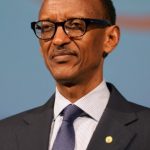Politics
Rwanda Politics
This page explores Rwanda’s political structure incorporating real-time RSS feed news and videos. By harnessing the power of RSS feeds, visitors can stay informed about the latest developments in Rwanda’s politics as they happen. The dynamic nature of these feeds ensures that users receive up-to-the-minute updates on political events, policy changes, and significant milestones, enabling them to stay abreast of the ever-evolving political scene.

Paul Kagame
4th President of Rwanda
Incumbent
Assumed office
22 April 2000
Image credit
Rwanda is a landlocked country located in East Africa. It operates as a presidential republic with a multi-party system. The political structure of Rwanda is defined by its constitution, which was adopted in 2003 and has been amended since then.
At the top of the political structure is the President of Rwanda, who serves as both the head of state and the head of government. The President is elected by popular vote for a seven-year term and can be re-elected for one additional term. The President has executive powers and is responsible for leading the government, implementing policies, and representing the country internationally.
The legislative branch of Rwanda is a bicameral institution called the Parliament. It comprises the Chamber of Deputies and the Senate. The Chamber of Deputies has 80 members who are elected through a mix of direct and indirect elections for a five-year term. The Senate has 26 members, with 12 senators elected by local councils, eight senators appointed by the President, and four senators elected by institutions and organizations determined by law. The Parliament is responsible for making laws, approving the national budget, and providing oversight of the executive branch.
Rwanda has an independent judiciary, which is responsible for interpreting and applying laws, ensuring justice, and protecting the rights of individuals. The judiciary plays a crucial role in upholding the rule of law and promoting justice and reconciliation in the country.
Political parties in Rwanda play a significant role in the political landscape. The dominant political party in the country is the Rwandan Patriotic Front (RPF), which has been in power since the end of the Rwandan Genocide in 1994. Other registered political parties also participate in elections, but the RPF has traditionally been the dominant political force.
Rwanda has made significant strides in rebuilding and reconciling its society after the tragic events of the 1994 genocide. The country has implemented policies focused on national unity, economic development, and social progress. Rwanda has also embraced a strong emphasis on gender equality and has achieved notable progress in women’s representation in politics. Overall, the political structure of Rwanda is characterized by a presidential republic with a separation of powers between the executive, legislative, and judicial branches. The country holds regular elections, allowing citizens to participate in the democratic process and choose their representatives at various levels of government.
Unless other sources are listed, original content is provided by ChatGPT. ChatGPT may produce inaccurate information about people, places, or facts. #Rwanda #RwandaPolitics #RwandaNews #RwandaNewsToday #RwandaRSSFeed #BlahFace



